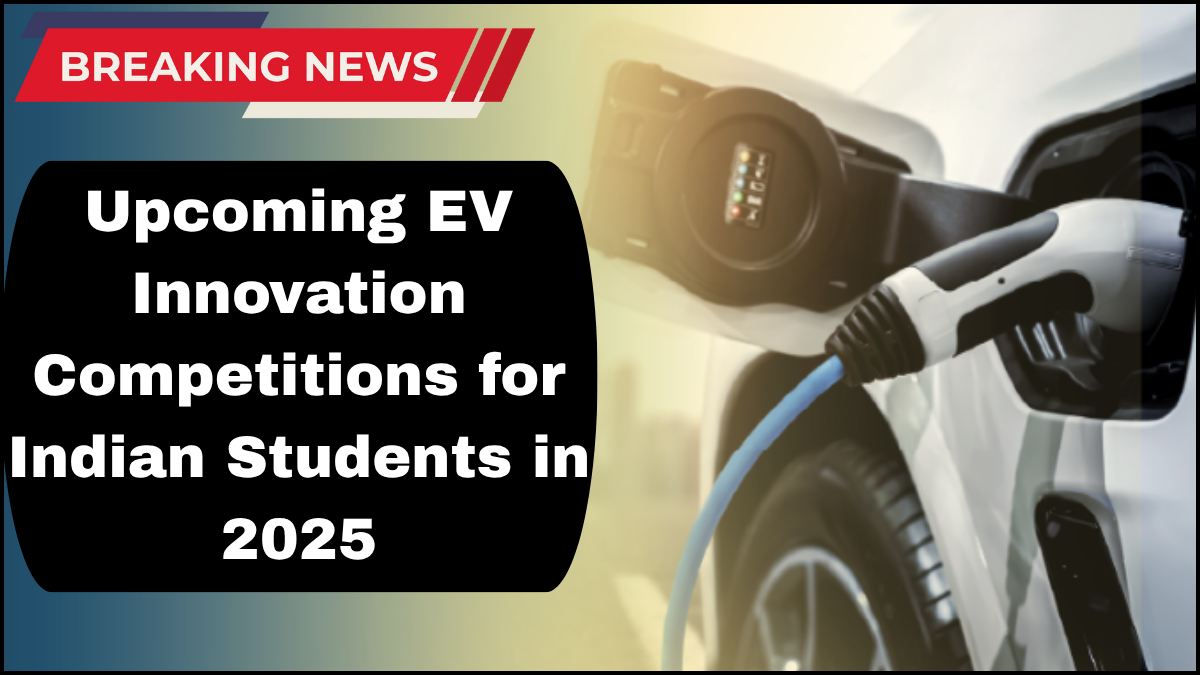As India accelerates toward an electric future, the need for young minds to contribute to electric vehicle (EV) technology is greater than ever. Recognizing this urgency, 2025 is set to host several high-impact EV research competitions aimed at Indian students. These contests are more than just a showcase of talent—they are launchpads for student innovation, technical mastery, and industry collaboration.
Here’s a comprehensive look at the top upcoming EV innovation challenges that will shape the next generation of electric mobility leaders in India.

1. Smart India Hackathon 2025 – EV Track
The Smart India Hackathon (SIH) has consistently provided a national platform for solving real-world problems through technology. In 2025, SIH will include a dedicated EV challenge, inviting students to develop practical solutions in battery management, charging systems, thermal regulation, and EV telematics.
Who Can Participate: UG/PG students from technical institutions across India
What’s at Stake: National exposure, mentorship from industry experts, and funding opportunities for further development
Key Focus Areas:
-
Intelligent Battery Monitoring
-
Sustainable EV Charging Infrastructures
-
Lightweight EV Component Design
-
Vehicle-to-Grid (V2G) Integration
2. ASME EFx India – Mobility Innovation Challenge
The American Society of Mechanical Engineers (ASME) will organize EFx India with a strong emphasis on sustainable mobility. The 2025 edition includes a special challenge on EV research, encouraging interdisciplinary teams to propose breakthrough designs in drivetrain systems and energy efficiency.
Why It Stands Out:
Unlike many competitions, EFx encourages collaboration between engineering, design, and business students—mirroring real-world startup environments.
Judging Criteria:
-
Feasibility of the technology
-
Cost-efficiency
-
Scalability
-
Environmental impact
3. ISIE India’s Formula Electric Student Championship
Organized by the Imperial Society of Innovative Engineers (ISIE), this is one of India’s premier EV racing competitions for students. The 2025 season focuses on pushing the boundaries of electric vehicle engineering by challenging teams to design, build, and race their own electric formula-style cars.
Benefits:
-
Hands-on experience in EV prototyping
-
Networking with top automotive firms
-
Placement opportunities with EV startups and OEMs
Extra Edge: Teams also participate in business plan and cost analysis rounds, which train them in real-world entrepreneurship.
4. Ather Energy EV Innovation Sprint
In 2025, Ather Energy is set to launch its first annual EV innovation sprint for Indian college students. The competition will center on solving specific product challenges, such as reducing charging time, enhancing vehicle range, and integrating AI for smarter navigation systems.
Unique Features:
-
Direct mentorship from Ather R&D engineers
-
Internship offers for top-performing students
-
Use of proprietary datasets for building advanced EV solutions
This initiative is a sign of how deeply India’s EV industry is investing in student innovation as a talent pipeline.
5. National Electric Mobility Challenge by NITI Aayog
Slated for late 2025, this nationwide contest will be conducted in collaboration with industry stakeholders and top-tier educational institutions. Its goal is to create scalable, affordable EV technologies suitable for the Indian market.
Highlights:
-
Multiple competition tracks: 2-wheelers, 3-wheelers, battery systems, and urban mobility design
-
Finalists to receive incubation support from Atal Innovation Mission
-
Winners may be fast-tracked for government pilot programs
This competition directly supports India’s vision for cleaner urban transport and reduced dependency on fossil fuels.
How These Competitions Empower Student Innovators
All these events go beyond recognition and prizes—they provide the structure and resources necessary for turning concepts into viable EV technologies. Participating in EV research competitions exposes students to real-world challenges, current market demands, and the fast-evolving regulatory environment of the EV industry.
These contests also serve as ideal platforms for networking with peers, entrepreneurs, and potential employers, giving participants a head start in their careers. For engineering colleges, active participation helps foster a research-centric culture, pushing institutions to align more closely with industry trends.
Tips for Students Preparing for EV Competitions
-
Form Diverse Teams: Combine mechanical, electronics, software, and design skills to approach problems holistically.
-
Stay Updated: Follow EV policy changes, market trends, and technological breakthroughs.
-
Prototype Smartly: Focus on minimum viable prototypes that are practical and scalable.
-
Pitch with Clarity: Learn to communicate technical ideas effectively to both engineers and business stakeholders.
FAQs
Q1: What are EV research competitions?
EV research competitions are structured events where students create and present innovative solutions related to electric vehicles, ranging from hardware and software components to full vehicle prototypes.
Q2: Can non-engineering students participate?
Yes. Many competitions welcome business, design, and sustainability students, especially where innovation involves interdisciplinary thinking.
Q3: Are there any international EV challenges open to Indian students?
Yes. Contests like Shell Eco-marathon and the World Solar Challenge accept Indian teams and often feature dedicated EV categories.
Q4: What kind of support do winners receive?
Winners may receive cash prizes, mentorship, incubation support, internship offers, and even funding for commercializing their innovations.
Q5: How do these competitions benefit long-term careers?
They add credibility to your resume, open doors for networking, and often lead to direct recruitment by top EV companies or tech incubators.
click here to learn more